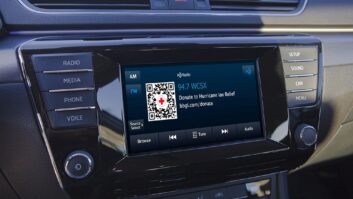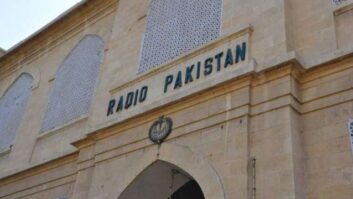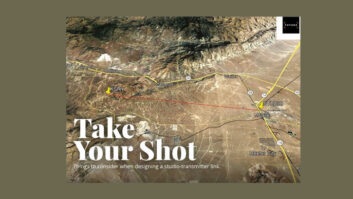
DAB’s regulation opens up new choice across the capital.
Photo by James Cridland
LONDON — It’s not often that government regulation is highlighted as a force for good, but it is, in part, responsible for the wide variety of listener choice on DAB digital radio airwaves in the United Kingdom.
In London, around 65 digital radio stations are available throughout the capital, broadcasting all types of musical styles in a variety of different languages. Many of these stations are produced by broadcasters that are new to the U.K., rather than incumbent media companies.
NONDISCRIMINATORY
A multiplex operator, run by an individual company, acts as the landlord for each area’s DAB transmission network. Muxco operates nine DAB multiplexes, which provide local DAB services to 14 million people across England and Wales. Gregory Watson, Muxco’s managing director, explained that regulations mean they have to offer access to their multiplex space in a “fair, reasonable and nondiscriminatory” way.
The Broadcasting Act 1990 forms the backbone of the regulations that multiplex operators like Muxco must follow, Watson said, adding that “the regulator wanted freedom of entry and freedom of competition. Their attitude was that they didn’t care who broadcast in each particular market: they wanted to get as many people on as possible. ‘Fair, reasonable and nondiscriminatory’ means that as a broadcaster you should get the same access, and pay the same fees, as anyone else.”

Muxco Managing Director
Gregory Watson
Stations available in London include additional services from existing broadcasters, like Kiss Fresh, a new music station from dance station Kiss; a new footprint for international broadcasters, like Radio Sputnik, formerly known as the Voice of Russia; and brand new entrants.
The latest of these is Share Radio. Launched on Nov. 4. Share Radio is a London-wide talk station that aims to help listeners with everyday financial issues including investment, banking and budgeting. It produces live programming every day between 6 a.m. to 9 p.m.
Gavin Oldham, Share Radio’s managing director, wasn’t keen on just launching online. “The Internet really doesn’t reach people the same way as doing it on-air. It’s been a real help to get live on DAB. It has a very large potential audience base. It’s helped us to get started very well.”

Financial station Share Radio is London’s newest
service on DAB. Courtesy of shareradio.co.uk
Financial experts, rather than radio broadcasters, set up Share Radio. “We had a lot of great advice from existing broadcasters,” Oldham said, “but we’ve spent much of this year on a steep learning curve.”
MORE CHOICE
Oldham says that stations like his are filling a gap that existing broadcasters are missing, and this is made possible by the way access to a digital multiplex is regulated. “It’s very important to have a vibrant range of services that reach peoples’ needs. There’s a varied population base in London, so it’s very important that broadcasting does respond to that and make that available, and a large amount of stations are.”
DAB now has 25 percent of all radio listening in the U.K., with Internet radio and apps only accounting for 6 percent. DAB sets start from under £15 (US$24), and the industry is benefiting from increased take up in Europe, which is lowering receiver prices. It is now installed in the majority of new cars sold.
In London on FM there are a small number of low-powered ethnic language services, but 20 percent of London’s DAB digital radio stations are aimed at an ethnic audience. One of the oldest is Panjab Radio, a station that started broadcasting 14 years ago, initially via satellite television.

Surjit Ghuman is managing
director and founder
of Panjab Radio.
Panjab Radio caters for the Panjabi community, originally from India and Pakistan, who live in London and the West Midlands. Broadcasting speech, music and devotional programming, the station is now carried across various DAB multiplexes in England. Panjabi is the third most-spoken language in the country.
The Managing Director and Founder of Panjab Radio, Surjit S. Ghuman, said that satellite television was a good start, but it came with problems. “We found that people were listening to us there, through their television, but it wasn’t freeing up the TV for others to watch in the household,” he said.
“So we started broadcasting on DAB. We discovered that people bought new DAB radio sets if they offered programming aimed at their community,” added Ghuman. He capitalized on this opportunity by selling DAB receivers too, making a profit on each set sold, as well as using DAB receivers as an advertisers’ benefit.
BENEFIT
He thinks the U.K.’s regulation works well, when compared to how DAB is regulated in other places. “In some countries, obviously the existing broadcasters don’t want to build competition for radio listeners. But it’s very important for the success of digital radio to offer choice. It’s important that niche broadcasters have an opportunity to broadcast, and gain access to the air. It’s a real benefit to the platform, and to the communities they serve.”
Muxco’s Watson points to increased opportunities for existing broadcasters, too. “On the Somerset multiplex recently, we added Pulse, which is a community station based in the Cheddar Gorge area that wants to be bigger and broadcast to a larger audience. The future of local isn’t dead: and through the regulation, it opens up opportunities for other people to come in, and to gain sensible coverage rather than a smaller FM transmitter,” he said.
“The regulation encourages expanding competition — both head-to-head which is always good in a market, to brand extensions from existing broadcasters and new services,” Watson concludes. “It’s a good model for radio.”
James Cridland reports on the industry for Radio World from London.












